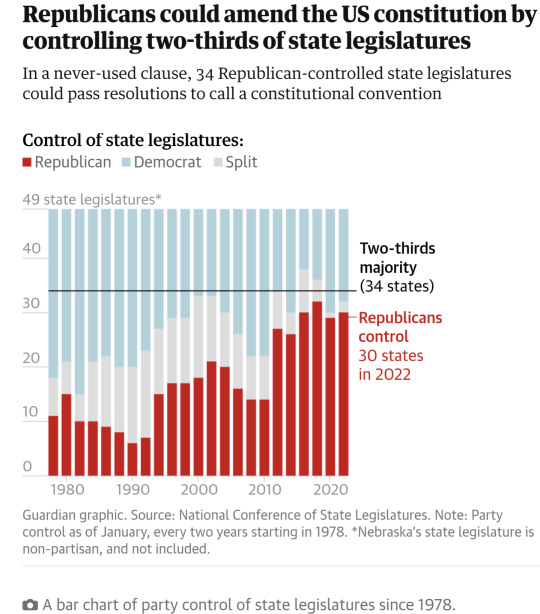#Article V
Text
Russia redraws maritime borders with NATO countries.
This is exceedingly dangerous on Putin's part. By doing this, he is walking right up to the line of outright annexing NATO territory, which would trigger NATO's mutual defence clause and likely initiate World War III.
My guess? He's testing NATO. If we let this slide, he'll conclude we don't have the resolve to fight Russia, and the next step will be a full-scale invasion of one or more of the Baltic countries.
Putin must die, or the world will burn.
5 notes
·
View notes
Text
Steve Bannon, the former chief strategist in the Trump White House who is at the forefront of the Republican march toward hard-right populism, is throwing his weight behind a movement to radically rewrite the US Constitution.
Bannon has devoted recent episodes of his online show the War Room to a well-funded operation which has stealthily gained ground over the past two years. Backed by billionaire donors and corporate interests, it aims to persuade state legislatures to call a constitutional convention in the hope of baking far-right conservative values into the supreme law of the land.
The goal is, in essence, to turn the country into a permanent conservative nation irrespective of the will of the American people. The convention would promote policies that would limit the size and scope of the federal government, set ceilings on or even abolish taxes, free corporations from regulations, and impose restrictions on government action in areas such as abortion, guns and immigration.
“This is another line of attack strategically,” Bannon told his viewers last month. “You now have a political movement that understands we need to go after the administrative state.”
By “administrative state”, Bannon was referring to the involvement of the federal government and Congress in central aspects of modern American life. That includes combating the climate crisis, setting educational standards and fighting health inequities.
Mark Meckler, a founder of the Tea Party who now leads one of the largest groups advocating for the tactic, the Convention of States Action (COSA), spelled out some of the prime objectives on Bannon’s show. “We need to say constitutionally, ‘No, the federal government cannot be involved in education, or healthcare, or energy, or the environment’,” he said.
Meckler went on to divulge the anti-democratic nature of the state convention movement when he said a main aim was to prevent progressive policies being advanced through presidential elections. “The problem is, any time the administration swings back to Democrat – or radical progressive, or Marxist which is what they are – we are going to lose the gains. So you do the structural fix.”
The “structural fix” involves Republican state legislatures pushing conservative amendments to America’s foundational document. By cementing the policies into the US Constitution, they would become largely immune to electoral challenge.
Were a convention achieved, it would mark the zenith of conservative state power in American politics. Over the past 12 years, since the eruption of the Tea Party, Republicans have extended their grip to more than half of the states in the country, imposing an increasingly far-right agenda on the heartlands.
Now the plan is to take that dominance nationwide.
Article V of the Constitution lays out two distinct ways in which America’s core document, ratified in 1788, can be revised. In practice, all 27 amendments that have been added over the past 244 years have come through the first route – a Congress-led process whereby two-thirds of both the US House and Senate have to approve changes followed by ratification by three-quarters of the states.
Meckler, working alongside other powerful interest groups and wealthy rightwing megadonors, is gunning for Article V’s second route – one that has never been tried before. It gives state legislatures the power to call a constitutional convention of their own, should two-thirds of all 50 states agree.

The state-based model for rewriting the US Constitution is perhaps the most audacious attempt yet by hard-right Republicans to secure what amounts to conservative minority rule in which a minority of lawmakers representing less-populated rural states dictate terms to the majority of Americans. Russ Feingold, a former Democratic US senator from Wisconsin, told The Guardian that “they want to rewrite the constitution in a fundamental way that is not just conservative, it is minoritarian. It will prevent the will of ‘we the people’ being heard.”
Feingold has co-authored with Peter Prindiville of the Stanford constitutional law center The Constitution in Jeopardy, a new book that sounds the alarm on the states-based convention movement. “Our goal is not to scare people, but to alert them that there is a movement on the far right that is quietly getting itself to a point where it will be almost impossible to stop a convention being called,” he said.
His urgency is underlined by how active the movement has become. A convention resolution framed by COSA has passed so far this year in four states – Wisconsin, Nebraska, West Virginia and South Carolina.
The group has also been busy around November’s midterm elections, using its muscle and some $600,000 (£528,252) of its reserves to support candidates amenable to the idea. “We have built the largest grassroots activist army in American history,” Meckler told Bannon, probably hyperbolically.
Bannon’s other guest on the War Room, Rick Santorum, a former Republican US senator from Pennsylvania who advises COSA, told Bannon: “This is something that can happen very quickly. We are a lot further along than people think.”
They are also much better funded than people might think. The Center for Media and Democracy (CMD), which monitors the constitutional convention movement, estimates that it pulled in $25M (£22M) in 2020, the last year for which figures are known.
The funds were split between COSA and other influential groups on the right. They include the American Legislative Exchange Council (ALEC), a network of state politicians and corporate lobbyists which has taken up the cry for a constitutional amendment to force balanced budget restrictions on Washington.
Much of the income is dark money, with the origins hidden. CMD has managed to identify some key donors – among them the Mercer Family Foundation set up by reclusive hedge fund manager Robert Mercer, and a couple of groups run by Leonard Leo, the mastermind behind the rightwing land grab in the federal courts.
More than $1m (£880,265) has also been donated in the form of Bitcoin.
The attraction to these groups and donors of pursuing a states route to rewriting the US Constitution is easily explained. Over the past 12 years, since the eruption of the Tea Party in 2010, Republican activists have deployed extreme partisan gerrymandering to pull off an extraordinary takeover of state legislatures.
In 2010, Republicans controlled both chambers of just 14 state legislatures. Today, that number stands at 31.
“Republicans are near the high watermark in terms of their political control in the states, and that’s why the pro-Trump rightwing of the party is increasingly embracing the constitutional convention strategy,” said Arn Pearson, CMD’s executive director.
Should a convention be achieved, the plan would be to give states one vote each. There is no legal or historical basis for such an arrangement but its appeal is self-evident.
One vote per state would give small rural conservative states like Wyoming (population 580,000) equal leverage to large urbanized progressive states like California (39.5 million). Collectively, small states would be in the majority and control would tip to the Republicans.
Last December Santorum spelled out this minoritarian vision at a private ALEC meeting. In an audio recording obtained by CMD, Santorum said: “We have the opportunity, as a result, to have a supermajority, even though we may not even be in an absolute majority when it comes to the people who agree with us.”
Pearson decried such thinking as “a profoundly anti-majoritarian and anti-democratic strategy that gives small rural states most control”.
With the counting system skewed towards the conservative heartlands, the list of amendments that might be pursued is disconcertingly large. Though Meckler and his allies largely avoid talking about culture war issues, it is quite conceivable that a nationwide ban on abortion and a rescinding of gay marriage would be on the table.
More openly, advocates have talked about imposing balanced budget requirements on the US government that would dramatically shrink federal resources. Some have even proposed making income tax unconstitutional.
One of the more popular ideas circulating within rightwing constitutional convention circles, initially floated by the talk show host Mark Levin, is that states should grant themselves the ability to override federal statutes and supreme court rulings. It is hard to see how the federal rule of law could be sustained under such an arrangement with its unmistakable civil war undertones.
Under Article V, 34 states would have to call for a constitutional convention to reach the two-thirds requirement. COSA has so far succeeded in getting 19 states to sign up, with a further six in active consideration.
ALEC, which sets a narrower remit for a convention focused on its balanced budget amendment, has gone further with 28 states on board.
Either way, there is a shortfall. To address it, constitutional convention leaders have invented increasingly exotic mathematical formulas for attaining the magic number, 34. “We used to call it fuzzy math, now we call it wacky math,” Pearson said.
Advocates filed a lawsuit in Texas in February that tried to get the courts to force a constitutional convention on grounds that they had reached 34 states already – they cobbled together unrelated state convention calls, including some dating back to the 1800s. In July two bills were also introduced to the US House requiring Congress to call a convention immediately.
David Super, a law professor at Georgetown University, said the willingness to adopt outlandish logic should sound further alarm bells. It raised the stakes even higher for the November elections.
“The midterms are crucial,” Super said. “Changes at state-level matter, but will not get them to 34 states. If they can take control of Congress, they could bridge the gap.”
Paradoxically, what happens to Congress in the midterms could have the biggest impact on the future prospects of a states-based constitutional convention. Should the Republicans take back control of the US House and Senate they would be in a position to advance radical Republicans’ demands.
“We’ve already seen a willingness to play fast and loose with the math on all sorts of things in Congress,” Super said. “I would not be surprised if they were to make a serious attempt to adopt one of these bizarre accounting theories should they take control of both chambers in November.”
That could mean a rapid dash for a convention before most Americans would have woken up to the danger.
“If the Republicans prevail in Congress, they could try to call a convention right away,” Feingold said. “People should know that when they go to vote in November – this could fundamentally undermine their rights in a way that is both disturbing and permanent.”
#us politics#news#the guardian#2022#constitutional convention#steve bannon#war room podcast#alt right#gop#republicans#conservatives#Mark Meckler#tea party#Convention of States Action#us constitution#article v#Russ Feingold#Rick Santorum#Center for Media and Democracy#American Legislative Exchange Council#Robert Mercer#Leonard Leo#gerrymandering#mark levin#david super
61 notes
·
View notes
Note
apparently the senate cannot be removed without the consent of every state so would it be feasible to amend that requirement out of the constitution then have a 2nd amendment that abolishes the senate or amend the constitution to remove the senate once every state has consented than go about pushing legislation to consent to the removal of the senate in every state?
Let's be a little bit clearer about what Roger Sherman of Connecticut inserted into the Constitution to assuage his deeply stupid fears about the need to protect the world's most meaningless political category:
"no State, without its Consent, shall be deprived of its equal Suffrage in the Senate."
In other words, you cannot fix the disproportionality built into the Senate - even if you manage the immense task of passing a Constitutional Amendment, it would be null and void because of Article V. And no, you can't amend the language that says you can't amend the language - judges really won't go for it.
There are been various schemes proposed to try and get around this - do it through legislation instead of amendment, pass an amendment that changes the definition of the world "equal," abolish the Senate altogether. - but I don't think any of them would work either.
However, Article V only affects the disproportionality of the Senate; anything else about the Senate is up for grabs:
The filibuster is purely a matter of internal Senate rules and potentially can be changed by simple majority vote as long as that majority is willing to change the Senate rules.
bicameralism - Article V doesn't protect the Senate's role in passing legislation - an amendment altering Article I and Article II would be entirely valid - so that you could essentially turn the U.S Senate into the equivalent of the House of Lords. In fact, technically I think you could do it by a Senate Rule basically saying "any bill passed by the House shall be considered to be passed by the Senate." The difficulty is finding a majority of Senators willing to politically neuter themselves.
21 notes
·
View notes
Text

3x wdc max verstappen is a passenger princess 🥰
#max verstappen#f1#formula 1#formula one#this is the only thing from the gq article that that matters to me#also the comment about how the kids at the karting paddock were essentially speaking on sign to each other cuz of how different they were#that was v cute
1K notes
·
View notes
Text
It is “the most important case for American democracy in the almost two and a half centuries since America’s founding,” J Michael Luttig, a well-respected, retired conservative federal judge wrote in the Atlantic earlier this year.
“Such a doctrine would be antithetical to the Framers’ intent, and to the text, fundamental design, and architecture of the Constitution,” wrote Luttig, who recently signed on as co-counsel for litigants opposing the theory.
For "independent state legislature" theory to be valid, there would be no Article V of the U.S. Constitution. There is. It isn't.
#not the one thing#the parasite one percent#scotus#inequality#voter intimidation#voting while black#article 5#article v#independent state legislature theory#islt
0 notes
Text
Just thought about … oh my god. Bakugo’s first real battle with a formidable villain after your kid is born; he’s not exactly “out of shape” (he never quit the gym, routine, etc… just changed it), but he’s thrown down hard in the first couple seconds, and he’s slower to get back into position—taking the time to steady his feet and assess the terrain, pushing out the lil tummy he gained feeding you postpartum delicacies as he cracks his back—
And the villain, god help them, decides to call out to him as they use the few seconds of vulnerability to attack again, screaming, “hey pop pop, don’t tell me parenthood has made you soft! How ‘bout I start calling you ‘daddy,’ too?”
Just as Bakugo’s turning back around with a new fire in his eyes, blood all warmed up, and shooting off to grab them by the throat to end the fight in one single move.
#Bakugo#the whole of Japan has been waiting on Bakugo’s return since he took paternity leave#so this is a big fight for him —- not just in terms of it being a test of his own strength but also because the medias hanging off his back#waiting to put out articles about whether he’s gotten stronger or weaker#they already put out tons about his ‘dad bod’ and the fact he hasn’t been focusing as hard on agility at the gym#hahaha turns out making sure his baby is strong and that you recover has taught him a lot of things#(aside from that you’ve been liking his thicker stature as of late too… aka: phat confidence booster)#and it’s that he can also be an absolute powerhouse at defensive maneuvers alongside attacking#aka: Bakugo gets back from his paternity leave with an all new fighting style 10x more sturdy than two years ago#being a dad has also made his confidence go up about 5000% so he’s become a bit more nonchalant in fights#hence why he’s not afraid to warm himself up before going in for the kill#LMAOOOO I need to let myself be corny#time to wash my hair now tho and check on my v#womiting kitty#gen#kids tw#caitie post
411 notes
·
View notes
Text
From the article:
"A Turkish operated merchant vessel, the MV Aya, has been hit by a Russian Kh-22 missile launched by a Tu-22M Backfire bomber. The Belize-owned, St. Kitts & Nevis flagged ship was sailing from the port of Chornomorsk, carrying 26,550 tons of grain for Egypt."
A couple of points here:
Ukraine is a major supplier of grain, especially to poorer countries (including Palestine). Russia is waging economic warfare and inflicting potential starvation on all those countries.
I'm not sure how this applies when the ship is Turkish-operated by not owned or flagged, but Turkey is a NATO member. If Russia struck a Turkish ship deliberately, and as the article notes it seems deliberate due to the vessel's distance from military targets, I believe that would be a potential grounds for invoking NATO's Article V, the mutual defence clause (ie, direct war between Russia and NATO, World War III).
I doubt anyone will be eager to do that, though, especially as there were, thankfully, no deaths.
#Ukraine#Russia#Turkey#Kremlin War Criminals#Palestine#Hunger#Starvation#Economy#NATO#Article V#World War III#Slava Ukrainii
0 notes
Text
Republicans have campaigned behind the scenes for years now to change the Constitution through a gathering of 34 state legislatures known as a constitutional convention.
A constitutional convention, designated by Article V of the Constitution, would allow state legislatures to pass or ratify constitutional amendments without a governor's signature, Congress' intervention, or any input from the President.
Some Republicans attempt to use a convention, which has never been accomplished in U.S. history, to limit the federal governments spending and taxation powers and enact term limits on more federal officials.
Former Democratic Senator Russ Feingold and constitutional scholar Peter Prindiville write in their new book "The Constitution in Jeopardy" that a "runaway" convention has the potential to go off-script and create massive changes in how the federal government regulates laws concerning health care, education, and the environment.
Prindiville told the Times that the convention would operate as a "free-standing, distinct constitutional body" without clear guidance on how it would function because the rules of a constitutional convention were never detailed by the framers.
"Despite convention proponents' claims of legal certainty, the most important questions about how a convening held under Article V would be called and how it would function are unsettled," Feingold and Prindiville write in their book, according to the Times.
"The framers left no rules. In this uncertainty lies great danger and, possibly, great power."
Insider's Grace Panetta and Brent D. Griffiths previously reported on the Republican plan to assemble a constitutional convention to gut environmental regulations and education standards while making it more difficult for Washington, DC or territories like Puerto Rico to earn statehood.
Rob Natelson, a key Article V scholar in the movement to call a convention, previously dismissed the potential of a "runaway" convention to Insider.
The Convention of the States, which has ties to prominent Republicans like former Trump lawyer John Eastman, has pushed for narrow revisions of the Constitution that would limit "the power and jurisdiction" of the federal government.
David Super, a professor and Constitutional law expert at Georgetown University Law Center, told Insider that limiting the power of the federal government could actually result in extreme and broad changes.
"I defy you to name a Constitutional amendment that you might want that I couldn't characterize as one of the three things in the Convention of States," Super told Panetta and Griffiths. "You want to repeal the 14th Amendment Equal Protection Clause? That's limiting the power of the federal government to interfere with state laws. Almost anything you want, you can characterize as one of those things."
Nineteen states have so far passed a Convention of States' resolution — with five states making progress on the resolution — according to an Insider analysis. Three states — South Dakota, Iowa, and North Carolina — have Republican-led state legislatures.
Backers of a constitutional convention include Eastman, Florida Gov. Ron DeSantis, and Fox News personalities like Sean Hannity and Mark Levin.
Natelson previously told Insider that he predicts there is a 50% chance the country will be able to form one within the next five years.
#us politics#news#republicans#conservatives#2022#gop#republican platform#constitutional convention#article v#us constitution#Russ Feingold#Peter Prindiville#The Constitution in Jeopardy#Grace Panetta#Brent D. Griffiths#Rob Natelson#Convention of the States#john eastman#gov. ron desantis#sean hannity#mark levin#David Super
17 notes
·
View notes
Text

#look this onion article title was so trevor#trikey#trevor philips#michael de santa#gta v#gta 5#grand theft auto 5
352 notes
·
View notes
Text
Housing insecurity is racist & violent
"Seventy-five national, state, territorial, and local domestic violence, sexual assault, and human trafficking organizations filed an amicus brief with the Supreme Court of the United States (SCOTUS) urging it to support the rights of people who are homeless, including unhoused survivors, in City of Grants Pass, Ore. v. Johnson. This case is one of the most important SCOTUS cases regarding homelessness in the past 40 years. The amicus brief, authored by the National Housing Law Project and Sexual Violence Law Center, argues that housing is extremely limited for gender-based violence survivors, often forcing them to make impossible choices between sleeping outside or suffering continued violence. Criminalizing survivors will only increase their and their families’ risk of violence, trauma, and housing insecurity."
Article from July 29:
Housing advocates across Indian Country say Native Americans and Alaska Natives likely will feel the full weight of a June 28 Supreme Court ruling that has cleared the way for cities to enforce bans on unsheltered people sleeping outside in public places.
Native Americans experience homelessness at a disparate rate. Advocates say the housing crisis is a reflection of our society’s unwillingness to address systemic issues.
“It’s criminalizing poverty,” said attorney Caroline LaPorte, who is an immediate descendant of the Little River Band of Ottawa Indians. “We are much more comfortable with putting, and paying, for people to be incarcerated.”
LaPorte is the director of the STTARS Indigenous Safe Housing Resource Center, a project of the National Indigenous Women’s Resource Center, and she is the board chairman for the StrongHearts Native Helpline. STTARS focuses on the intersection of housing insecurity and gender-based violence. A lawyer, she said the Supreme Court’s decision was enraging.
“Everybody belongs in our communities. They deserve to be safe, and it is our responsibility. We are required to make sure that those people have the things that they need,” LaPorte said.[...]
Announced on June 28 in a 6-3 decision along ideological lines, the court found that outdoor sleeping bans don’t violate the Eighth Amendment, which protects against cruel and unusual punishment.
#Supreme Court#homelessness#native news#grants pass v. johnson#intersectional#intersectional feminism#equality#poverty#supreme court rulings#i know its not new but I saw the nm article and felt the need to post it with as much context as possible#especially given how the tribes in new mexico such as the Diné are also protesting illegal uranium transportation on their land#the Diné are being done hella fucking dirty#Navajo nation#Diné#caroline laporte#little river band of ottawa indians#ojibwe#solidarity#DV#systemic oppression#biden#capitalism#ndn#native americans#native American#housing insecurity#homeless#misogyny#racism#white supremacy
196 notes
·
View notes
Text
youtube
#constitution#article v#convention of states#limit power#founding fathers#term limits#self governance#steve deace#Youtube
0 notes
Text
everyone who mistreats cats is going to hell :-(
#i get sad even when Garfield the cartoon cat gets hurt. once felt like crying in a comic online where he died.#the ny times article mila shared :-( poor baby :-(#v
99 notes
·
View notes
Text


Full article x
#haha#raven smith#vogue#opinion article#3 July 2024#Louis Tomlinson#30 June 2024#euro 2024#tv#England v Slovakia#Louis press#mine
84 notes
·
View notes
Photo


Batman v Superman : Dawn of Homoeroticism (2016)
Directed by Zack Snyder
#ben affleck#dcedit#dceuedit#bvsedit#batmanedit#cinemapix#filmtvsource#filmtvedit#superheroedit#cinemagifs#cinemasource#superbat#superbatedit#mine.#edit: gifs.#film: batman v superman.#i dont actually recommend the article from where this joke comes from#but its still an accurate descriptor for them so#q.
893 notes
·
View notes